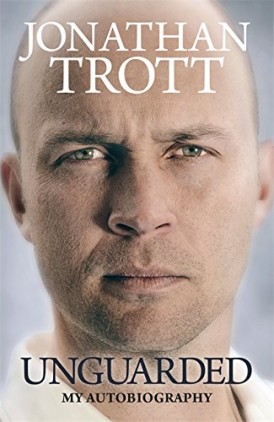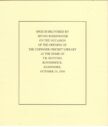Unguarded
Martin Chandler |Published: 2016
Pages: 279
Author: Trott, Jonathan
Publisher: Sphere
Rating: 4.5 stars

The 2009 Ashes series was, in my estimation, not too far short of 2005 in terms of the excitement and interest it created. After the humiliation of 2006/07 England fans were desperate to believe that 2005 hadn’t been a false dawn, and I remember vividly the debate surrounding team selection for the vital fifth Test. Being something of a sentimentalist at heart I was keen to champion the cause of 39 year old Mark Ramprakash. When Jonathan Trott was picked instead I was not unduly surprised, but certainly disappointed.
As one would hope the selectors knew what they were doing. The 28 year old Trott was one of the heroes of England’s victory. He contributed a useful 41 to England’s first innings. In the second, after a rocky start, he held England together with a superb 119 without which Australia might well have won. I still recall Andrew Flintoff’s throw to run out Ricky Ponting, and I revelled in Steve Harmison rolling back the years to grab three late wickets as the climax approached, but I must confess that Trott’s contributions quickly faded from my memory. I suspect there was a lingering disappointment about Ramprakash’s omission
Following a start like that Trott’s future as a Test batsman was assured and he was an important and consistent part of the successful England sides that followed. In 2010/11 he averaged 89 as England won an Ashes series in Australia for the first time in a quarter of a century. Australia’s attack was at full strength, and it was established beyond any doubt that Trott was a top class batsman.
In 2013 England won the Ashes again. Trott wasn’t so imperious this time and did not inspire the same confidence he had in the past, but he still got to 40 five times, without going past 59. That winter it was off to Australia for another high pressure Ashes campaign. Trott was suffering from what I now know is described as a situation based anxiety. He was in a very dark place and left the tour after a nightmarish experience in the first Test.
By the end of the 2013 series in four years Trott had played 48 Tests and 68 ODIs in four years. There had been seven overseas tours and a World Cup in that time. It is an astonishing workload. How many lawyers could contemplate conducting 48 five day trials and 68 of a single day over such a period? Having read Unguarded I don’t believe that is as ludicrous a comparison as it would have seemed to me before I opened the book.
Throughout Trott is brutally frank about what happened and how he felt as his world fell apart. His is not the first account we have had recently about mental health problems amongst cricketers, but there are marked differences between Trott’s issues and those of Marcus Trescothick, Graeme Fowler and Mike Yardy. Of those three only the experience of Trescothick is comparable in terms of the stage their careers had reached when the moment of no return came. Something they certainly shared was that both suffered from some ill-informed criticism from a media hungry for information about their situations.
An impressive aspect of Unguarded is the way in which it is written. Trott must have spent many hours with his ghost, George Dobell, a man I was familiar with beforehand only from his writings on cricinfo. He begins Trott’s story in Barbados in 2015, before going back to a South African childhood. He then delays the feel-good parts of the story until after he has graphically described the nightmare of Brisbane in 2014. The penultimate chapter then returns to Barbados to bring the story of Trott’s international career to its conclusion.
The story is told by Trott, Dobell choosing not to weave into the narrative the substantial input he received from Trott’s wife, Abi, teammates Andrew Strauss, Kevin Pietersen and Alistair Cook as well as coaches Andy Flower and Ashley Giles. Their contributions appear under their names as appropriate and add much to the narrative. All are supportive. Of course not everyone was, and as there are no acknowledgements it is not possible to know whether or not Michael Vaughan was ever asked to explain his views – he above all must have a thorough understanding of how gruelling life as an international cricketer must be, and the old truism, that whilst form might be temporary class is most certainly not.
Most notable amongst Trott and Dobell’s achievements is that their reader is left with an understanding of what the problem is and was. This is important because however much I learned from Marcus Trescothick’s book I have never been able to quite understand why, given his consistency for Somerset in recent years, there has never been talk of a recall amidst all the struggles to find an opening partner for Cook. With Trott however I fully understand why, no matter how many runs he scores for Warwickshire, there will be no return to England’s colours.
Unguarded is an excellent book, and the best possible reply to those who have been critical of its author . There will doubtless be many who read the book and set out to do so with, as this reviewer did, doubts as to how to judge Trott’s career. By the time they get to the end however they will no longer remember Jonathan Trott as the man who was bounced out of the game by Mitchell Johnson. His legacy will be what he wants it to be, that of a fine England batsman who was an important member of as many as three Ashes winning teams.






Leave a comment